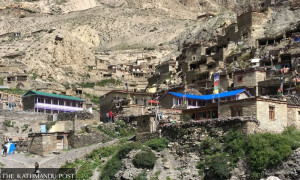National
More firms, persons blacklisted for loan defaults
13,510 have been blacklisted so far this year. Total hits 29,390. Pandemic and growing cases of cheque bounce blamed.
Prithvi Man Shrestha
The number of individuals and firms blacklisted by the Credit Information Bureau at the request of banks and financial institutions nearly tripled in the current fiscal year 2021-22.
According to the bureau, a total of 13,510 individuals and firms were blacklisted until July 8 from the beginning of the current fiscal year in mid-July last year. In the previous fiscal year 2020-21, a total of 4,880 firms and individuals were blacklisted.
More than 5,000 firms were blacklisted in less than three months of the latest quarter, according to the bureau.
Individuals and firms defaulting on loans and those failing to issue non-funded or underfunded cheques are blacklisted by the bureau as per the request of the banks and financial institutions concerned.
The number of blacklisted persons and firms has increased substantially at a time when the country is trying to recover from the impact of the Covid-19 pandemic.
Bankers say both the negative impact of the pandemic and growing cases of cheque bounce contributed to the rise in the blacklisted firms and individuals in the current fiscal year.
“In our bank’s case, there has been a rise in cheque bounce cases. We have written to the bureau to blacklist those who issued cheques without balance in the bank,” said Krishna Adhikari, the chief executive officer of the Nepal Bank Limited. “A bank can write to the bureau to blacklist somebody who issues cheques twice without adequate balance.”
He, however, admitted that borrowers have been facing economic difficulties due to the pandemic and that a majority of them have been honest in repaying the loans.
During the first Covid lockdown in early 2020, as many as 61 percent of businesses were forced to close down completely, according to a survey conducted by the Nepal Rastra Bank, the central bank.
The survey shows that 35 percent of businesses operated partially while four percent operated fully during the lockdown period. The small and medium-scale enterprises and early-stage startups were badly hit, according to the survey
Businesses laid off one-fourth of their employees during the lockdown period that lasted for four months.
An International Finance Corporation (IFC) survey released in September 2020, showed over 80 percent of Nepal’s micro, small and medium enterprises (MSMEs) suffered from a slump in sales amid the pandemic.
The IFC survey also revealed that over half of Nepal’s MSMEs faced the risk of permanently closing their operations since the economy was far from recovery from Covid-19 impacts. MSMEs contribute 22 percent to Nepal’s gross domestic product employing about 1.75 million people, according to the IFC.
When the economy was experiencing a slight bounce back after the first wave of the pandemic, the country was forced to shut down again due to the deadly second wave of the pandemic in April 2021. Despite the massive impact of the pandemic on businesses, the default rate does not appear to be so big.
According to the Nepal Rastra Bank, non-performing loans of the banks and financial institutions stood at 2.41 percent as of mid-May. Non-performing loans mean the size of the defaulted loans.
If the defaulted loans go over five percent, the situation is considered serious. Citing the impact of the pandemic, the central bank came up with schemes that allowed borrowers to pay at later dates and banks could put such loans under the ‘good’ category.
“The banks might have also provided extra loans to the borrowers to turn their debt into good category loans after the borrowers failed to pay,” said Himalal Paudyal, spokesperson at the Agriculture Development Bank Limited. “Since the banks can no longer provide extra credit to such borrowers owing to lack of loanable funds, such borrowers might not pay their loans and could get blacklisted.”
Like other bankers, Paudyal also believes the pandemic is one of the major causes behind the rising cases of borrowers being blacklisted. “People have not been able to repay the loans as their businesses remained closed for months,” he said. “Cases of cheque bounce have also been growing.”
The bureau has been blacklisting individuals and firms since the early 1990s. The government-owned Bansbari Leather and Shoe Factory, which was later privatised and dissolved, is still in the government blacklist.
The bureau was established in Nepal in May 1989 with the sole objective of improving the functionality of the country’s financial system. It started its operation as an independent and autonomous entity on March 25, 2005, by registering under the Company Act. According to the bureau, there are now 29,390 firms and individuals blacklisted by it as of July 8.




 17.12°C Kathmandu
17.12°C Kathmandu















